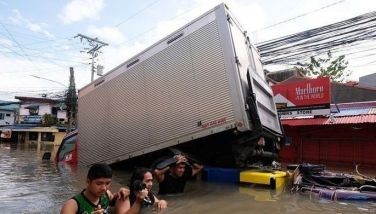YearEnder: Philippine finally accedes to join Paris deal on climate change

The 2015 Paris climate change deal took effect with the Philippines’ ratification this year. But after meeting with the Cabinet, President Duterte finally gave in, as joining the deal means necessary funds for the country’s environmental management initiatives.
MANILA, Philippines – The 2015 Paris climate agreement took effect this year without the ratification of the Philippine government, partly due to the shifting positions of President Duterte on climate change and the efforts to curb carbon emissions across the world.
The accord is tied with possible assistance that the country could receive from the international community to protect the environment and at the same time mitigate the effects of climate change, including more frequent natural disasters.
Throughout the year, the Climate Change Commission (CCC) has launched various initiatives to ensure the participation of different sectors in addressing the changing climate and mitigating its effects.
During a resilience forum with local communities in Bohol last July, CCC Secretary Emmanuel de Guzman warned that efforts to address poverty and pursue sustainable development in the Philippines would go to waste if climate change adaptation measures were not put in place in the most vulnerable communities.
“There is evidence showing that the poor are the worst-hit in weather-related disasters. Unless the government comes out with climate-risk sensitive development plans, efforts to reduce poverty are at risk of stalling or even of losing hard-won gains,” he said.
The CCC also urged the business sector to help in addressing global warming by shifting to clean energy and providing support to local communities.
The agreement, adopted by 195 countries during the Conference of Parties in Paris in December 2015, went into effect last Nov. 4 after parties representing 55 percent of global greenhouse emissions ratified its provisions.
The Philippines – which was among the countries that pushed for the more ambitious target of limiting global warming to 1.5 degrees Celsius – closes the year without the ratification of the agreement, which it signed at the UN headquarters in New York on April 22.
While former president Benigno Aquino III repeatedly committed support for the accord, his successor had a different position when he took over the government on June 30.
During the second presidential debate in Cebu, then Davao City mayor Rodrigo Duterte called the United Nations and other industrialized countries “hypocrites” for pushing developing countries such as the Philippines to reduce its carbon emissions when it barely contributed to the changing climate.
“Why can’t they go to China and stop it? Why do they come here telling us what to do when as a matter of fact we need energy to develop, we are just a developing nation,” said the candidate, who won by a landslide in the May elections.
Duterte reiterated his position in July, relating in one speech a conversation with an ambassador who reminded him about the country’s commitment to ratify the Paris accord.
“That’s stupid. I will not honor that. He said, you signed. That was not my signature,” he recalled during the send-off ceremonies for Philippine athletes competing at the Rio Olympics.
The President appeared to have backed down on the matter after a meeting with US Secretary of State John Kerry, with Malacañang saying “everything should be okay” as long as the provisions were fair to the economic development of the country.
- Latest
- Trending































